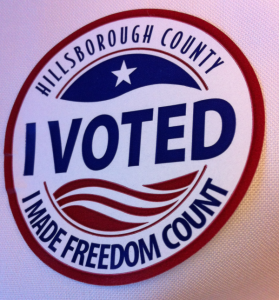More developments on the effort by the State of Florida to remove allegedly non-citizens from the voting rolls – the State has agreed to have local supervisors of elections notify the majority of those on the prior “purge” list of their eligibility to vote. An AP story labeled this as a “settlement,” while the Miami Herald is reporting the case is not settled. The Advancement Project has posted the agreed-upon stipulation. Meanwhile, another site is reporting that the State has begun training local supervisors on how to use the federal Homeland Security SAVE database for verifying eligibility.
“Indicative Ruling” issued by Federal Court on HB1355 voter registration rules
The U.S. District Court in Tallahassee has issued a “Indicative Ruling on the Motion for a Permanent Injunction” regarding the challenged filed against Florida’s HB1355 limits on voter registration activities. (Document courtesy of The Brennan Center)
Rules
As talk of fights and compromises over party rules develop a few miles from my office in Tampa, here are some resources to look at:
“The Rules of the Republican Party” adopted back in 2008 and the “Call for the 2012 R.N. Convention,” posted on the GOP’s Counsel webpage.
Quotes from the Federal Preclearance Opinion
As I wrote about earlier today, the U.S. District Court for the District of Columbia issued any order precleared one section of HB1355 (regarding voters who had moved within the State) but not precleared the change to early voting days (though it did telegraph to the State how it could be precleared).
The Court also included the following analysis of some of the State’s arguments:
- Florida’s proposed interpretation of the effect test would thus mean that section 5 could not prevent the adoption of modern-day equivalents of Jim Crow-era voting laws. To state that proposition is to refute it.
- Voting is a fundamental right, “preservative of other basic civil and political rights,” Reynolds v. Sims, 377 U.S. 533, 562 (1964), and no amount of voter disenfranchisement can be regarded as “de minimis.”
- Further, as we explain in more detail in the course of our discussion of specific voting changes, see infra Part II.B.1, we disagree with Florida’s position that a change is not retrogressive if it affects “in the aggregate significantly more [w]hites than minorities.” Fla. Br. 53 (emphasis added). Focusing on the effects of voting changes in absolute terms would mean that almost no ballot access change would be considered retrogressive; after all, the fact that fewer members of a particular group are present in the overall electorate is part of what it means to be a minority group. Applying the effect test in the manner Florida suggests would thus allow covered jurisdictions to enact changes with clearly adverse effects on minority voters so long as more white voters were also affected. That approach would fly in the face of the Voting Rights Act’s primary goal of protecting minority voting populations. The retrogression assessment must therefore be conducted in relative terms, with reference to the proportions of each group affected by the change.
- Although we have concluded that we cannot preclear Florida’s early votingchanges at this time because those changes authorize the covered counties to offer a statutory minimum number of hours that may result in retrogression, it is possible that the counties will instead, as Florida predicts, opt to provide substantially more hours than that minimum. As we discuss below, under at least one such scenario we are persuaded that Florida would likely satisfy its burden of showing a nonretrogressive effect: that is, if the covered counties were to provide the maximum authorized 96 hours on a standard 7 a.m. to 7 p.m. schedule. When a court finds that it cannot preclear one iteration of a submitted plan, but may be able to preclear a modified version, the Supreme Court has expressed
approval for issuing a kind of “conditional order” indicating the circumstances under which approval may be obtained. See, e.g., City of Port Arthur, 459 U.S. at 167-68 (expressing approval of the district court’s “conditional order” denying preclearance of the expansion of a city’s borders unless the city agreed to eliminate a majority-vote requirement for certain elections); City of Richmond, 422 U.S. at 370 (stating that the district court in City of Petersburg, 354 F. Supp. 1021, “was correct in conditioning approval of the annexation upon the adoption of the plan to elect councilmen by wards”). We do so here.
-
In sum, the record evidence persuades us that, if the covered counties offer the maximum available early voting hours each day on a standard 7 a.m. to 7 p.m. schedule, the negative effect of reducing the number of days from 12 to 8 would likely be offset by the ameliorative effects of adding non-working weekday hours, a Sunday, and additional weekend hours.
Federal Court issues Preclearance Order
In a 119 page order, the U.S. District Court for the District of Columbia (the court hearing the State’s preclearance request for HB1355 after the State withdrew part of its request to the USDOJ for preclearance) issued an order last night. The order focuses on two of the HB1355 provisions: “(1) amend the available days and hours that Florida counties may use for early in-person voting, …and (2) amend the voting procedures for registered voters who move between Florida counties and seek to vote in their new county of residence (“inter-county movers”),”
I’m still going through their analysis, but here is the court’s conclusion:
“To summarize, we have reached the following conclusions:
First, we conclude that we cannot preclear Florida’s early voting changes at this time because the State has failed to satisfy its burden of proving that those changes will not have a retrogressive effect on minority voters if the covered counties offer only the minimum number of early voting hours required under the new statute, which would constitute only half the hours required under the prior law. We also conclude, however, that if Florida and the covered counties were to submit a preclearance plan that offered early voting for the maximum number of hours authorized by the new statute, which would be exactly the same number as under the prior law, and did so on a standard 7 a.m. to 7 p.m. schedule, Florida likely would satisfy its burden of proving that the overall effect of its changes in law would be nonretrogressive. Accordingly, we will deny Florida’s request for a declaratory judgment granting preclearance of the early voting changes and dismiss Count Three of the Third Amended Complaint, without prejudice.
Second, we conclude that Florida has satisfied its burden of proving that the changes to the procedures for inter-county movers neither were enacted with a discriminatory purpose nor will have retrogressive effects on minority voters. We will therefore enter a declaratory judgment on Count Two of Florida’s Third Amended Complaint preclearing those changes.
A separate order implementing these decisions will be issued this day.”
Vote! Today (8/14) is Primary Day.
Check your voter status here on the State’s website, including polling place information.
Election results after 7pm in the Central time zone. (Remember Florida polls close at 7pm in your time zone!)
Florida law limiting political donations by teens enjoined
A federal judge in the Southern District of Florida has enjoined the Florida Elections Commission from enforcing Fla. Stat. 106.08(1)(b)(2), which provides, in part:
“an unemancipated child under the age of 18 years of age may not make a contribution in excess of $100 to any candidate or to any political committee supporting one or more candidates.”
The law was challenged by a then seventeen year old (and represented by the ACLU) who wanted to attend a $150/ticket political fundraiser.
Congresswoman files suit in Jacksonville – challenging changes to early voting law
A U.S. Congresswoman from the Third Congressional District in Jacksonville, Florida, has filed suit in Federal District Court challenging the HB1355 changes to early voting passed in 2011. These changes shortened the number of days of early voting and this law has been put into effect in 62 of Florida’s 67 counties, while litigation continues over the law’s compliance with the Federal Voting Rights Act. Early voting for the primary election starts on Monday, July 30th in Collier, Hardee, Hendry, Hillsborough & Monroe Counties – the other 62 counties start early voting on August 4th.
Florida granted access to Homeland Security database
Per a Department of State Press release: “Florida Secretary of State Ken Detzner and the Florida Department of State (DOS) have received a commitment from the U.S. Department of Homeland Security that Florida will be able to access the Systematic Alien Verification for Entitlements Program (SAVE) database.” You can read the press release on the Secretary’s website. It is not yet clear how the use of this database will be managed or how information will be provided to the local Supervisors of Elections. See Letter to Supervisors, courtesy of Dan Smith’s blog.
Florida’s two-tier election laws challenged
The ACLU, the National Council of La Raza, and a Florida State Senator have filed an administrative challenge to the rules promulgated by the Secretary of State. As outlined in prior posts on this blog, Florida presently has two sets of election laws – one set that applies in 62 counties and one set that applies in the 5 other counties (the counties that require federal preclearance for election law changes). The State Senator’s district crosses county lines and those particular counties presently have different election rules.
- « Previous Page
- 1
- …
- 3
- 4
- 5
- 6
- 7
- …
- 12
- Next Page »

